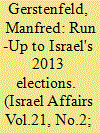| Srl | Item |
| 1 |
ID:
093901


|
|
|
|
|
| Publication |
2010.
|
| Summary/Abstract |
The Israel Our Home (Israel Beiteinu, IB) party became the major surprise of the 2009 elections, winning 15 Knesset seats. Two-thirds of these seats were won through Russian speakers, who entered Israel in the recent waves of Russian Jewish immigration; and a third came from veteran and native Israelis. This composition showed a major dilemma of IB - to find a modus vivendi between the party's nationwide aspirations and its predominantly Russian community character. The IB's electoral success was a result of its concept of a 'population and territories exchange', which was a 'neo-centralist alternative' to both the 'land for peace' of the left and the 'peace for peace' concepts of the right, as well as the charismatic figure of the party leader Avigdor Lieberman, who better than anybody else succeeded in expressing the feeling of frustration of the various peripheral groups in Israeli society.
|
|
|
|
|
|
|
|
|
|
|
|
|
|
|
|
| 2 |
ID:
137544


|
|
|
|
|
| Summary/Abstract |
On 15 October 2012, the 18th Knesset – which had been elected in February 2009 – voted unanimously to dissolve. The date for the elections for the 19th Knesset was then set for 22 January 2013. This article follows the events leading to the election day. It shows that there were four distinct phases during that period. It describes the internal organization and primary elections in Israel's major parties, Likud and Avoda; the debate about the formation of political alliances which led to the joint list of Likud–Israel Beiteinu; the stabilization of the political blocs; and the emergence of new political forces (such as Yesh Atid). The article also discusses the impact of major events, such as the military operation Pillar of Defence, on the elections and the electoral campaign. The article discusses the parties’ campaigns and the proliferation of opinion polls. It also shows that much of the campaigning of the parties was directed against other parties of the same bloc, be it the centre-right or the centre-left.
|
|
|
|
|
|
|
|
|
|
|
|
|
|
|
|